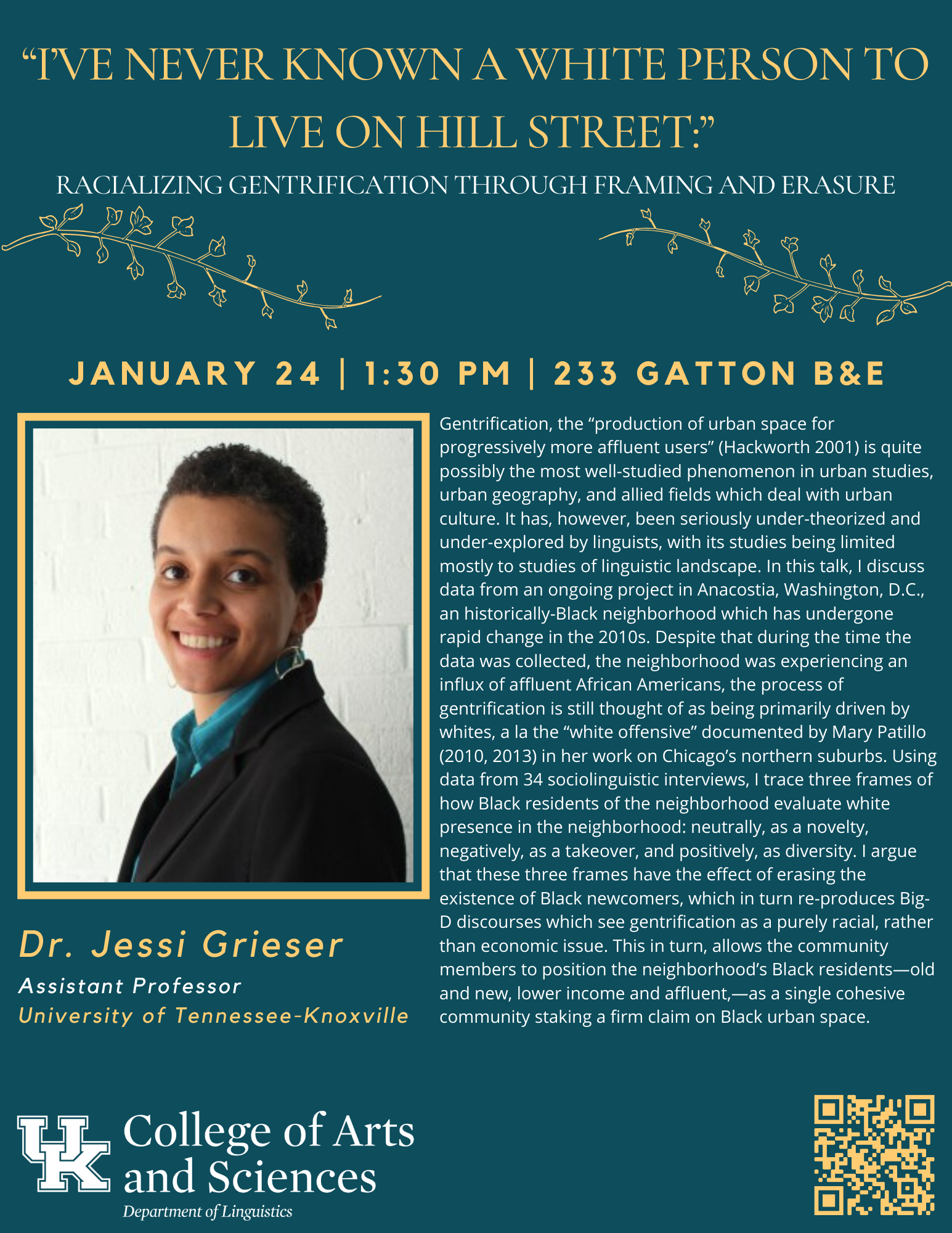Colloquium Speaker Series
Braille and language processing.
Braille and language processing.
“I’ve never known a white person to live on Hill Street:” Racializing Gentrification through Framing and Erasure
Gentrification, the “production of urban space for progressively more affluent users” (Hackworth 2001) is quite possibly the most well-studied phenomenon in urban studies, urban geography, and allied fields which deal with urban culture. It has, however, been seriously under-theorized and under-explored by linguists, with its studies being limited mostly to studies of linguistic landscape. In this talk, I discuss data from an ongoing project in Anacostia, Washington, D.C., an historically-Black neighborhood which has undergone rapid change in the 2010s. Despite that during the time the data was collected, the neighborhood was experiencing an influx of affluent African Americans, the process of gentrification is still thought of as being primarily driven by whites, a la the “white offensive” documented by Mary Patillo (2010, 2013) in her work on Chicago’s northern suburbs. Using data from 34 sociolinguistic interviews, I trace three frames of how Black residents of the neighborhood evaluate white presence in the neighborhood: neutrally, as a novelty, negatively, as a takeover, and positively, as diversity. I argue that these three frames have the effect of erasing the existence of Black newcomers, which in turn re-produces Big-D discourses which see gentrification as a purely racial, rather than economic issue. This in turn, allows the community members to position the neighborhood’s Black residents—old and new, lower income and affluent,—as a single cohesive community staking a firm claim on Black urban space.

Dunstan is the NCSU Assistant Director of the Office of Assessment. Her research examines dialect as an element of diversity that shapes the college experience, particularly for speakers of non-standardized dialects of English. Dunstan and Jaeger (2015) found that students from rural, Southern Appalachia felt that their use of a regional dialect put them at a disadvantage in the college classroom. The students interviewed by Dunstan reported that “they had been hesitant to speak in class, felt singled out, dreaded oral presentations, tried to change the way they talked, and felt that they had to work harder to earn the respect of faculty and peers”. In addition to speaking about her work with Appalachian college students, Dunstan would accompany members of the Department of Linguistics to a meeting with the UK office of Academic and Student Affairs to discuss how to meet the needs of all UK students, regardless of linguistic background.
Dunstan is the NCSU Assistant Director of the Office of Assessment. Her research examines dialect as an element of diversity that shapes the college experience, particularly for speakers of non-standardized dialects of English. Dunstan and Jaeger (2015) found that students from rural, Southern Appalachia felt that their use of a regional dialect put them at a disadvantage in the college classroom. The students interviewed by Dunstan reported that “they had been hesitant to speak in class, felt singled out, dreaded oral presentations, tried to change the way they talked, and felt that they had to work harder to earn the respect of faculty and peers”. In addition to speaking about her work with Appalachian college students, Dunstan would accompany members of the Department of Linguistics to a meeting with the UK office of Academic and Student Affairs to discuss how to meet the needs of all UK students, regardless of linguistic background.
This talk is made possible by generous support from our friends in Modern and Classical Languages, Literatures and Cultures; English; Gender and Women’s studies; Sociology; Writing, Rhetoric and Digital Studies; African American and Africana Studies; and the College of Arts and Sciences.
This talk is made possible by generous support from our friends in Modern and Classical Languages, Literatures and Cultures; English; Gender and Women’s studies; Sociology; Writing, Rhetoric and Digital Studies; African American and Africana Studies; and the College of Arts and Sciences.
In this presentation, David Costa will provide an introduction to MiamiIllinois, an Algonquian language of Indiana and Illinois. Costa will first discuss the geographic setting of Miami-Illinois and its place with Algonquian, following with an overview of the data sources on the language. He will also provide a brief sketch of the phonology of the Miami-Illinois, and, time permitting, finish with a discussion of some of the more notable grammatical features of the language, such as animacy, transitivity, pro-drop, obviation, and basic word order